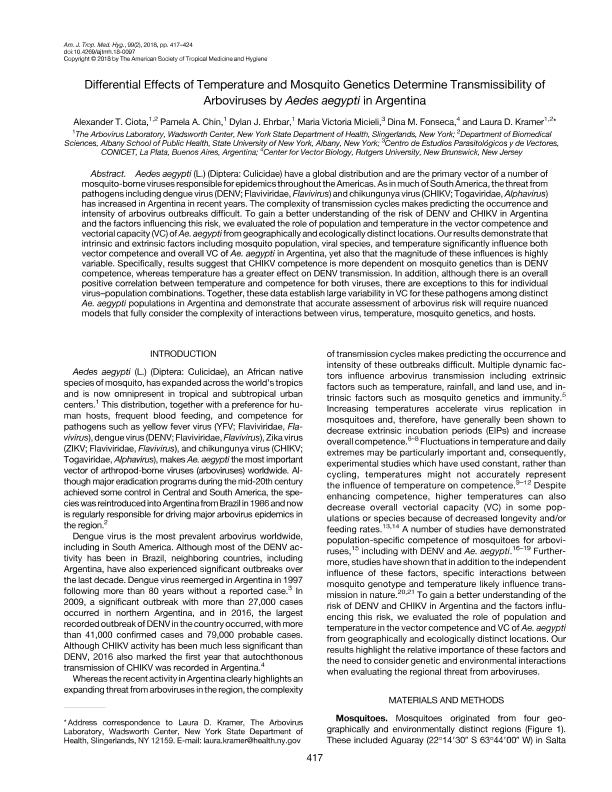Mostrar el registro sencillo del ítem
dc.contributor.author
Ciota, Alexander T.
dc.contributor.author
Chin, Pamela A.
dc.contributor.author
Ehrbar, Dylan J.
dc.contributor.author
Micieli, Maria Victoria

dc.contributor.author
Fonseca, Dina M.
dc.contributor.author
Kramer, Laura D.
dc.date.available
2019-10-29T12:54:06Z
dc.date.issued
2018-06
dc.identifier.citation
Ciota, Alexander T.; Chin, Pamela A.; Ehrbar, Dylan J.; Micieli, Maria Victoria; Fonseca, Dina M.; et al.; Differential Effects of Temperature and Mosquito Genetics Determine Transmissibility of Arboviruses by Aedes aegypti in Argentina; American Society of Tropical Medicine and Hygiene; American Journal of Tropical Medicine and Hygiene; 99; 2; 6-2018; 417-424
dc.identifier.issn
0002-9637
dc.identifier.uri
http://hdl.handle.net/11336/87486
dc.description.abstract
Aedes aegypti (L.) (Diptera: Culicidae) have a global distribution and are the primary vector of a number of mosquito-borne viruses responsible for epidemics throughout the Americas. As in much of South America, the threat from pathogens including dengue virus (DENV; Flaviviridae, Flavivirus) and chikungunya virus (CHIKV; Togaviridae, Alphavirus) has increased in Argentina in recent years. The complexity of transmission cycles makes predicting the occurrence and intensity of arbovirus outbreaks difficult. To gain a better understanding of the risk of DENV and CHIKV in Argentina and the factors influencing this risk, we evaluated the role of population and temperature in the vector competence and vectorial capacity (VC) of Ae. aegypti from geographically and ecologically distinct locations. Our results demonstrate that intrinsic and extrinsic factors including mosquito population, viral species, and temperature significantly influence both vector competence and overall VC of Ae. aegypti in Argentina, yet also that the magnitude of these influences is highly variable. Specifically, results suggest that CHIKV competence is more dependent on mosquito genetics than is DENV competence, whereas temperature has a greater effect on DENV transmission. In addition, although there is an overall positive correlation between temperature and competence for both viruses, there are exceptions to this for individual virus?population combinations. Together, these data establish large variability in VC for these pathogens among distinct Ae. aegypti populations in Argentina and demonstrate that accurate assessment of arbovirus risk will require nuanced models that fully consider the complexity of interactions between virus, temperature, mosquito genetics, and hosts.
dc.format
application/pdf
dc.language.iso
eng
dc.publisher
American Society of Tropical Medicine and Hygiene

dc.rights
info:eu-repo/semantics/openAccess
dc.rights.uri
https://creativecommons.org/licenses/by-nc-sa/2.5/ar/
dc.subject
MOSQUITO
dc.subject
AEDES AEGYPTI
dc.subject
DENGUE
dc.subject
CHIKUNGUNYA
dc.subject.classification
Zoología, Ornitología, Entomología, Etología

dc.subject.classification
Ciencias Biológicas

dc.subject.classification
CIENCIAS NATURALES Y EXACTAS

dc.title
Differential Effects of Temperature and Mosquito Genetics Determine Transmissibility of Arboviruses by Aedes aegypti in Argentina
dc.type
info:eu-repo/semantics/article
dc.type
info:ar-repo/semantics/artículo
dc.type
info:eu-repo/semantics/publishedVersion
dc.date.updated
2019-10-17T14:07:50Z
dc.identifier.eissn
1476-1645
dc.journal.volume
99
dc.journal.number
2
dc.journal.pagination
417-424
dc.journal.pais
Estados Unidos

dc.description.fil
Fil: Ciota, Alexander T.. Wadsworth Center. State of New York Department of Health; Estados Unidos
dc.description.fil
Fil: Chin, Pamela A.. Wadsworth Center. State of New York Department of Health; Estados Unidos
dc.description.fil
Fil: Ehrbar, Dylan J.. Wadsworth Center. State of New York Department of Health; Estados Unidos
dc.description.fil
Fil: Micieli, Maria Victoria. Consejo Nacional de Investigaciones Científicas y Técnicas. Centro Científico Tecnológico Conicet - La Plata. Centro de Estudios Parasitológicos y de Vectores. Universidad Nacional de La Plata. Facultad de Ciencias Naturales y Museo. Centro de Estudios Parasitológicos y de Vectores; Argentina
dc.description.fil
Fil: Fonseca, Dina M.. Center For Vector Biology, Rutgers University; Estados Unidos
dc.description.fil
Fil: Kramer, Laura D.. Wadsworth Center. State of New York Department of Health; Estados Unidos
dc.journal.title
American Journal of Tropical Medicine and Hygiene

dc.relation.alternativeid
info:eu-repo/semantics/altIdentifier/doi/http://dx.doi.org/10.4269/ajtmh.18-0097
dc.relation.alternativeid
info:eu-repo/semantics/altIdentifier/url/http://www.ajtmh.org/content/journals/10.4269/ajtmh.18-0097
Archivos asociados
